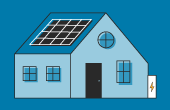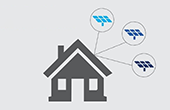The perfect system for a large Texas suburban setup that provides whole house back-up and almost 100% grid independence.
$4,950
$49,700
10.4%
Property
- Owner:
- Greg T.
- Type:
- Single-Family Residence
- Address:
- Colleyville, TX 76034
- Size:
- 4,000 sq ft
Technology
- Type:
- Solar PV
- Installed:
- September 2022
- Size of System:
- 19.4 kW
- Monitor performance:
- https://ei.tigoenergy.com/p/TakOakValley
- Purposes:
- To generate electricity
Financial Details
- Gross Cost of System:
- $71,000
- Value of Tax Credits:
- $21,300
- Net Cost of System:
- $49,700
- Annual Savings:
- $4,950
- Annual Revenue:
- $200
- Own or Lease:
- Cash Purchase
- Additional Financial Notes:
- With a solar+battery option free night plans make perfect sense for essentially net zero energy cost. Cash purchase (no interest, no fees) with direct dealing with an installer (no commission) is what makes the most financial sense.
Professionals & Suppliers
- Installers:
- Texas Solar Professional LLC
What You Need to Know
Description:
44x400W Aptos panels Sol-Ark 15K Inverter Tigo Optimizers with CCA Homegrid Stack'd 38.4 kWh battery sorage Emporia Energy Vue power meters and EV charger 16 east facing panels in 2x8 string configuration at 48 degree slope 16 south facing panels in 2x8 string configuration at 33 degree slope 12 west facing panels in 2x6 string configuration at 48 degree slope
Other Benefits:
Whole house backup, solar optimized EV charging
Maintenance Requirements:
None. Set it and forget it.
Efficiency or Sustainability Improvements:
House is 6 years old with good insulation and efficient appliances
My Motivation:
100% work from home requires resiliency. Cost of energy increasing and inflation made the solar install economically viable, even in Texas.
Advice:
Don't assume net metering is a viable option for you now or in the future. Plan your system to get to close to 100% self consumption. Do not buy a solar only system, always combine with a battery backup solution, it is a lot more expensive to add batteries later. For large systems I'd advise against Enphase microinverters, they do not have economies of scale and don't get cheaper as they get larger. Their battery solution is AC coupled, inefficient, and very expensive.
Experience with Installer:
Pick one that is willing to work with your needs and not one that is set on selling you the system or brand they're married to. The install goes quick once permits are in and the parts are obtained. Logistics and supply will slow the process down considerably, I don't think it is going to get better in the near future.
Open House Info:
You're welcome to reach out if you have more questions about my install and/or design.
View Other Case Studies
Search for Other Case StudiesThe EnergySage Marketplace










